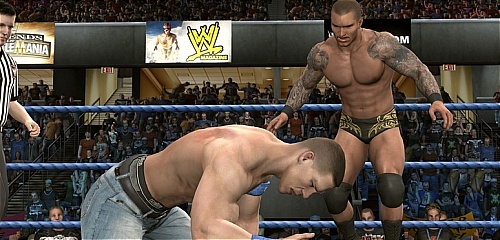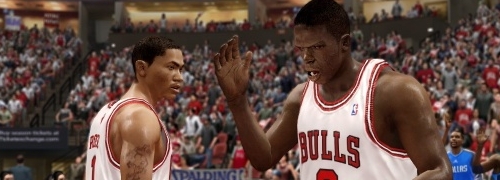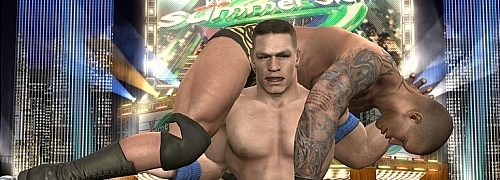Marcus Stephenson Moves To THQ For SvR

Some of you may already be familiar with Marcus Stephenson. He has been around for quite some time driving community initiatives or just being accessible within the community. After running a Madden fan site for years he took a position as a Community Manager at the EA Canada studio before moving between a few different projects, most notably as a Producer on NBA Live 10. He has now left the EA Sports studio and holds the position of Game Designer for WWE Smackdown vs Raw at THQ. I had the opportunity to ask Marcus a few questions about his time at EA and his new role at THQ.
PP: What prompted the decision to leave your current position to join THQ?
MS: I chose to leave EA because the opportunity to work in a lead position on the WWE franchise was too good to pass up, and most that know me know that wrestling has always been a big passion of mine.
PP: When you started working at EA Sports what were your main interests and what was the career path you had hoped for? How does the move to THQ change those plans or is the new position what you had always hoped for?
MS: I honestly didn’t know. When I first got to EA SPORTS, I just wanted to excel in what I was doing. I tried my best to bring community to the forefront of EA SPORTS, and I think I did that. Then I wanted to make an impact on a game team (as a Producer), and leverage my community experience, to create a better game – and I think we did that (NBA LIVE). I was at a crossroads at EA SPORTS on what exactly I wanted to do next (continue down the development path, or go back into community management). I accepted a role as Sr. Community Manager for FIFA ONLINE because, well, it’s FIFA – why wouldn’t I?
The move to THQ cements in my mind what and where I want to go from a personal career perspective. The new position is something I have always hoped for because I get to work on a passion of mine, with a franchise that has been successful for a number of years, and on a team that knows where it wants to go in the future.
PP: You have previously worked on NBA Live 10 before most recently moving to FIFA Online. At the time what was the reasoning for shifting away from working on NBA Live 11? Was that something you wanted to do or were you frustrated by the situation?
MS: I had such a fun time working on NBA LIVE 10, I’ll cherish those memories making that game forever, and I’ll miss that team! Things changed once NBA LIVE 10 shipped, and we started pre production on NBA LIVE 11. It was no longer a place I saw myself.
PP: When Mike Wang departed from NBA Live to re-join 2K Sports for NBA 2K11 he cited a big reason being a change in direction for the Live series. Would you agree with that assessment, that NBA Live may be moving away from being a simulation offering? That EA Sports is not committed to the vision that Mike Wang and yourself had for the future of NBA Live?
The way I see it, things change. I can’t say the direction NBA LIVE is moving in, I can say it will be “different,” but I think it will be up to all of you on what you want from a basketball simulation. There are guys on that team that know what’s being said out there, and they’re building something pretty special I think. Mike made his decision, just like I made mine, but I wish the NBA LIVE team success, and think they’re on a path to making that happen.

PP: What do you see as the strengths and weaknesses of the most recent Smackdown vs Raw?
MS: I think where the SvR series has gotten to from a customization perspective, is unmatched. You can basically create anything you want from characters, to unique storylines, and share them with the community. As for “weaknesses,” I think that every area in SvR could use improvement. That’s the goal that every team should have, at least in my experience. You can feel reassured that the team knows about every issue, but we want to make sure that we’re making improvements that effect the franchise long term, and not just for a short term temporary fix. I think sports games get caught up in the quick fix that creates more problems, instead of thinking long term to ensure quality and stability.
PP: Like any yearly title gamers inevitably scrutinize and ask if enough has been done in that one year to warrant another purchase. The WWE franchise has been viewed by some as lethargic and not having made the expected big advancements or in some cases even going backwards. How do you take WWE and enhance the experience every year?
MS: Thank god for software right? If we could get everything we wanted to get into SvR, or any sports game for that matter, in one year, we’d do it. With that said, I get the complaints, and think that as long as there are ideas, there will not be a “lethargic” sense to SvR.
Wrestling games have untapped potential when compared to other sports titles. We’re thinking of things that you guys haven’t ever dreamed (or have and were spot on) so I think there’s a lot of things left in the tank that we can do from a year to year basis to make sure SvR stays fresh year in and year out. You’ll find this out soon enough!
PP: Smackdown vs Raw 2010 saw marked improvement in reviews. The consensus seemed to be that the features were great but the gameplay still needed work. How do you feel about 2010 and how has the team looked at goals for 2011?
MS: I’d agree, the team made huge strides with last year’s effort, and even in gameplay, we saw improvements (seamless transitions between grapple states, dives, etc.). We have a plan for gameplay, and we really think it’s going to make a big difference. Bryan Williams and his team are working hard to keep building off of the things you saw last year, and introduce new things – but we’re getting way ahead of ourselves here. You’ll see soon!
PP: In what ways do you and those already working on SvR take feedback from the community and how do you utilize it to improve the game?
MS: I know our team reads what the community is saying, but that’s where I think I can have an immediate impact on the team. I’m planning to bring the two way communication to the SvR series, and that means that I’ll be available anytime, and answer every question. Even if I can’t answer the question, I’ll say “I can’t answer,” which is technically an answer. My point is that the community has always played a role in the creation of SvR, but this year, I’d like to bring that to another level!
PP: With THQ in control of the WWE license until at least 2018 does the license security result in the ability to implement more creativity and innovation or are there still limitations to what can be done?
MS: I think that the license deal helps us. That was actually a big reason for me coming here, so I’m glad it was able to happen. I’d say for us, if a simulation wrestling game is what you want, then no other company is in better position to do that than us. This license helps us achieve that goal!

PP: What is there about the WWE that could be better translated to a video game?
MS: The history. The WWE has a legacy that we all can’t deny. I think whether it’s through broadcast presentation, or new modes and features, we need to leverage that history better into SvR so that when you fire up the game, you get a sense of something bigger / greater than just the 2011 / 2012 snapshot or installment of that year.
PP: Is Smackdown vs Raw intended to appeal most to WWE fans or is the game also designed to reach gamers who may not watch much WWE? If you also hope to attract the casual fans how do you balance the game to be fun for everyone?
MS: That’s a great question. I think first we obviously need to appeal to the WWE fan. They’re our lifeblood, and the reason why we’ve been so successful. But I also know that games like “Wrestlemania 2000” and “No Mercy” transcended the audience, and appealed to everyone. I think that sometimes we tie the words “casual” and “fun” together, and maybe that might be the wrong way of looking at it. My belief is that if we create the ultimate WWE simulation, then the “casual” will want to check it out because of the game’s quality and attention to detail. I think that’s where the “ultimate user control” comes in.
You take a game like NHL, and wonder why that’s been so successful. They put control right into the user’s hands which made it fun for non-hockey fans to play because THEY were shooting, THEY were moving their stick. The same thing goes for Fight Night. When you feel like YOU’RE punching, you’re having fun.
PP: THQ also owns the incredibly successful UFC Undisputed series. Do you see THQ as building a “fighting” brand and becoming known for that?
MS: I’d hope so, yes. With the WWE and UFC at the forefront of THQ, I think we’re positioning ourselves to be the leader in the sports fighting space.
PP: What do you hope to hear gamers saying once Smackdown vs Raw 2011 is released?
MS: “SvR 2011 is so good that I’ve gotten into wrestling!”
Thanks to Marcus Stephenson for taking the time out to answer some questions! WWE Smackdown vs Raw 2011 is expected to release late fall/early winter.
